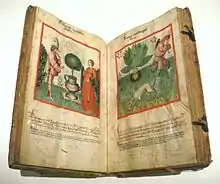Ibn Butlan
Ibn Butlan (Arabic: ابن بطلان; 1038,[1] 1075) was an Arab Nestorian Christian physician who was active in Baghdad during the Islamic Golden Age.

Ibn Butlan's Tacuinum sanitatis, Rhineland, 2nd half of 15th century.
He wrote the Taqwim al-Sihhah (The Maintenance of Health تقويم الصحة).[2] The work treated matters of hygiene, dietetics, and exercise. It emphasized the benefits of regular attention to the personal physical and mental well-being. The continued popularity and publication of this medieval text of Middle Eastern origin into the sixteenth century is thought to demonstrate the influence that Arabic culture had on early modern Europe.[1][3] One of his Greek sources was Dioscorides.[4]
Books
- Taqwim al-Sihha تقويم الصحة
- Da'avat al-ateba'
- Al-maqalat al-Mokhtarat fi tadbir al-amrad al-a'rezat al-aksar bel taghziat Ma'loofat
- Resalat fi shari al-raghigh va taghlib al-bai'd
- Maqalat fi an al-foroj ahar men al-farkh
- Al-maqalat al-mesriat fi monaghezat Ali Ibn Ridwan
- Maqal fi al-qorban al-moqadas[5] مقال في القربان المقدس
References
- Ibn Butlan's Tacuinum sanitatis in medicina. Strassburg, 1531.
- Forbes, Andrew ; Henley, Daniel; Henley, David (2013). 'Abu'l Hasan Ibn Butlan' in: Health and Well Being: A Medieval Guide. Chiang Mai: Cognoscenti Books. ASIN:B00DQ5BKFA
- Loudon, Irvine (2002-03-07). Western Medicine: An Illustrated History. Oxford University Press. ISBN 9780199248131. Retrieved 5 September 2012.
- "On Plants". World Digital Library. Retrieved 17 June 2013.
- http://www.tandorostan.org
| Wikimedia Commons has media related to Ibn Butlan. |
External links
- Arnaldez, R. (2008) [1970-80]. "Ibn Buṭlān, Abuʾl-Ḥasan Al-Mukhtār Ibn ʿAbdūn Ibn SaʿDūn". Complete Dictionary of Scientific Biography. Encyclopedia.com.
This article is issued from Wikipedia. The text is licensed under Creative Commons - Attribution - Sharealike. Additional terms may apply for the media files.